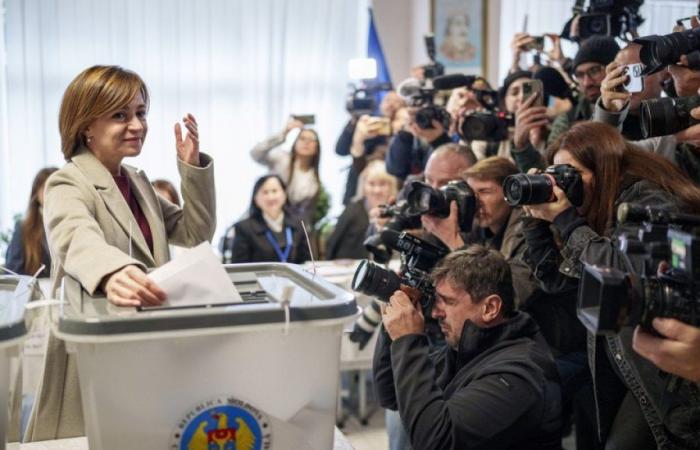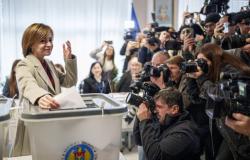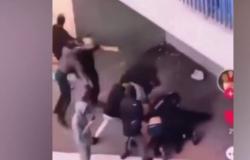
Nearly 95% of votes were counted in the EU referendum, which asks voters to choose whether to enshrine a path to the EU in the country’s constitution. Out of a total of 1.2 million ballots cast, approximately 52% voted “no,” while 47% voted “yes.”
ADVERTISEMENT
Moldova’s pro-Western President Maia Sandu appeared poised to win the first round of the presidential race, but she accused “criminal groups” of undermining the referendum asking voters to decide whether they want to embark on the path to membership of the European Union, which was at risk of being narrowly rejected.
Next to 95% of votes were counted in the referendum on the European Union, which asks voters to choose whether to include a path to the European Union in the country’s constitution. Out of a total of 1.2 million ballots, about 52% voted “no,” while 47% voted “yes.”
However, the ballots cast by the country’s large diaspora are still being counted and tend to favor the EU route.
“Criminal groups, working in concert with foreign forces hostile to our national interests, have attacked our country with tens of millions of euros, lies and propaganda, using the most shameful means to maintain our citizens and our nation in uncertainty and instability,” Maia Sandu said after around 90% of the ballots were counted.
“We have clear evidence that these criminal groups aimed to buy 300,000 votes – fraud on an unprecedented scale,” she added. “Their goal was to undermine the democratic process.”
These two crucial votes took place while Moldovan authorities claim that Moscow has intensified a ‘hybrid war’ campaign aimed at destabilizing the country and derailing it on the path to the European Union. The allegations include funding pro-Moscow opposition groups, spreading disinformation, interfering in local elections and supporting a massive vote-buying scheme.
In the presidential race, which has 11 candidates, Ms. sand seemed able to win the first round with 39% of the votesbut it is unlikely that she will obtain an absolute majority. She will probably face Alexander Stoianogloa former attorney general favorable to Russia who has outperformed the polls with around 28% of the voteduring a second round on November 3.
After polling stations closed at 9 p.m. (local time), more than 1.5 million voters, or about 51 percent of eligible voters, had cast their ballots, according to the Central Election Commission.
Cristian Cantir, a Moldovan associate professor of international relations at Oakland University, told The Associated Press that diaspora votes could prove crucial at this late stage.
“If I were a pro-EU politician, this is where I would look for signs of good news,” he said. “I think the ideal scenario for them would have been to have something that showed overwhelming support for the EU – and that just didn’t happen.”
Fears of Russian interference
US national security spokesman John Kirby echoed the fears ofRussian interference this week, declaring in a statement that “ Russia is actively working to undermine Moldova’s election and its European integration “. Moscow has repeatedly denied any interference in Moldova.
“Over the past few months, Moscow has spent millions of dollars influencing the presidential election in Moldova,” Mr. Kirby said. “We believe that this money was used to finance his favorite parties and to spread disinformation on social media in favor of their campaigns.”
In early October, Moldovan law enforcement said it had discovered a massive vote-buying operation orchestrated by Ilan Sor, an exiled pro-Russian oligarch who currently resides in Russiawhich paid 15 million euros ($16.2 million) to 130,000 people to compromise the two polls.
Mr. Șor was sentenced in absentia last year to 15 years in prison for fraud and money laundering in the case of the billion dollars that disappeared from Moldovan banks in 2014. He denied the allegations, saying that “the payments are legal” and invoking the right to freedom of expression. The populist parties of Ilan Şor (which bears the name of its leader), favorable to Russia, was declared unconstitutional last year and banned.
On Thursday, Moldovan authorities foiled another plot in which more than 100 young Moldovans received training in Moscow taught by private military groups on how to create civil unrest around the two votes. Some also followed a “ more advanced training in guerrilla camps » in Serbia and Bosnia, police said, and four people were detained for 30 days.
Ms Sandu voted in the capital on Sunday and told media that “Moldovans themselves must choose their own destiny, and not others, nor dirty money or lies.”
“I voted so that Moldova could develop in peace and freedom,” she said.
A pro-Western government has been in power in Moldova since 2021, a year after Mr Sandu won the presidency. Legislative elections will take place next year.
Moldova, a former Soviet republic of around 2.5 million inhabitants, applied to join the European Union following Russia’s all-out invasion of neighboring Ukraine on February 24, 2022, and was granted candidate status this summer, along with Ukraine. Brussels agreed in June to begin accession negotiations.





